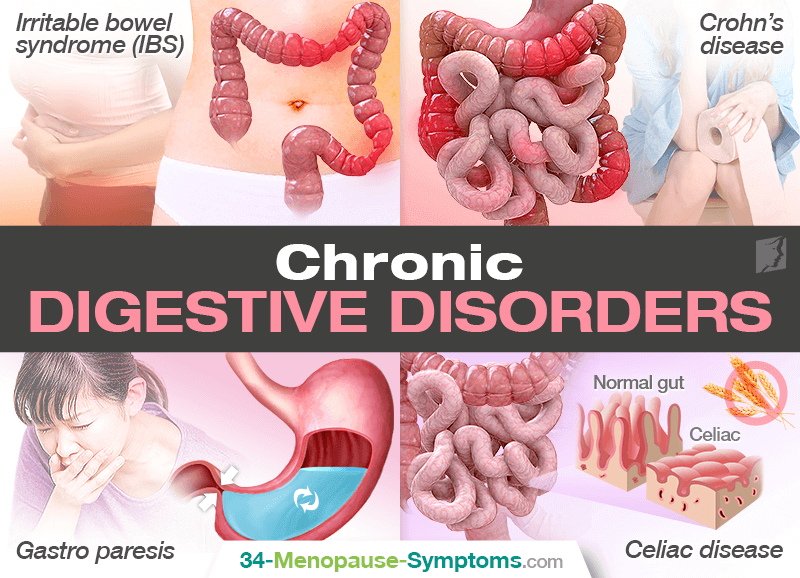Stomach problems are difficult to deal with, and become even more difficult when they don't go away. Chronic stomach issues are fairly common, but can still make life complicated. Read on to learn more about some of the most common chronic digestive disorders to see if the symptoms match your own.
Irritable Bowel Syndrome (IBS)
Irritable bowel syndrome, often abbreviated as IBS, is a condition that causes inflammation in the large intestine and can cause severe discomfort because of that.
Some of the most common symptoms of IBS are abdominal pain, cramping, bloating, and diarrhea or constipation (or both). Although up to 20% of the adult population of the United States may show symptoms of IBS, very few people will seek medical help for their symptoms despite the help that doctors may provide.
The cause of IBS is not completely understood, and there is no cure. However, there are treatments that can greatly improve symptoms and help patients live without the problems caused by IBS. These improvements in symptoms are mostly made through dietary changes, although some medications may help as well.
Crohn's Disease
Like IBS, Crohn's disease is a condition that causes inflammation, although the inflammation in Crohn's disease is not limited to the large intestine but rather affects the whole digestive system. Crohn's disease may also lead to life-threatening complications, so it is crucial to see a doctor if you suspect you have Crohn's.
Symptoms of Crohn's disease may be mild or severe, or may fluctuate between the two. They also may disappear for months or years at a time, but will resurface eventually. The main symptoms are diarrhea, fever, fatigue, pain, cramping, blood in the stool, reduced appetite, weight loss, and even mouth sores.
The cause of Crohn's disease is unknown, but it is theorized that there is a link between the chronic digestive disorder and an overactive immune system. It also appears to be hereditary, meaning it can be passed through families. There is no cure, but there are medications to help.
Gastro paresis
Usually, the stomach uses muscle contractions to help move food into the intestines to be digested. If this process is slowed down or does not work, it is called gastro paresis, or paralysis of the stomach.
Symptoms of this condition include nausea, vomiting, feeling full despite not eating much, acid reflux, bloating, pain, lack of appetite, weight loss, and malnutrition. Additionally, if the food that was vomited has not been digested, that is an indicator of the condition. Treatment involves dietary changes, medication, or even surgery.
Celiac Disease
Celiac disease is an inability to digest gluten, a protein found in wheat, barley, and rye. It occurs due to an immune response, and over time may cause severe damage to the small intestine, potentially causing life-threatening conditions.
Symptoms include anemia, brittle bones, rash, mouth ulcers, headaches, nervous system problems, joint pain, spleen problems, stomach pain, and bloating. There is no cure for celiac disease, and patients must avoid eating gluten in order to prevent damage to their intestines.
These common chronic digestive disorders may be the ones responsible for your chronic stomach issues. Either way, you should visit a doctor to investigate your symptoms more thoroughly. Read about five supplements to aid digestive problems for women.
Sources
- Crohn's& Colitis. (2016).Understanding Crohn's Disease. Retrieved June 20, 2017 from https://www.crohnsandcolitis.com/crohns
- Celiac Disease Foundation. (n.d.).What Is Celiac Disease. Retrieved June 20, 2017 from https://celiac.org/celiac-disease/understanding-celiac-disease-2/what-is-celiac-disease/
- Crohn's& Colitis. (2016).Understanding Crohn's Disease. Retrieved June 20, 2017 from https://www.crohnsandcolitis.com/crohns
- Mayo Clinic Irritable bowel syndrome. (2014).Irritable bowel syndrome. Retrieved June 20, 2017 from http://www.mayoclinic.org/diseases-conditions/irritable-bowel-syndrome/basics/causes/con-20024578
- National Health Service UK. (2017). Gastro paresis. Retrieved June 20, 2017 from http://www.nhs.uk/conditions/gastroparesis/Pages/Introduction.aspx




